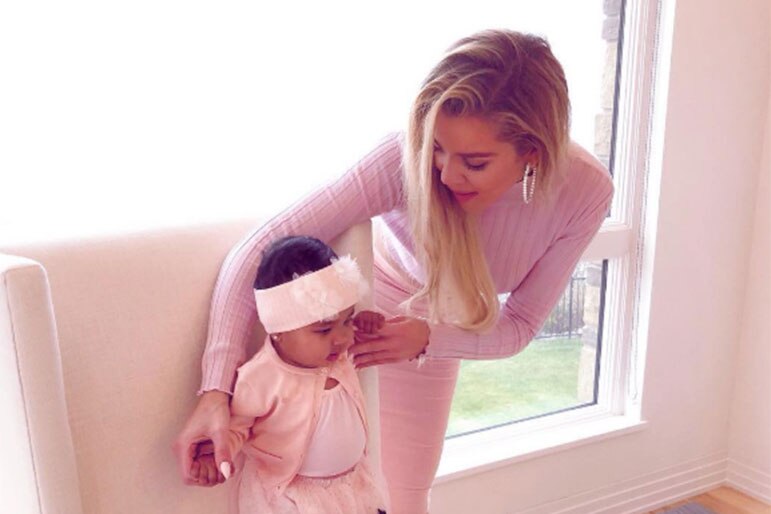Khloe Kardashian's Daughter Says "Dada" — But Can She Be Coached to Say "Mama?"
Was Kris Jenner's first word "money?"

It seems like Khloe Kardashian just gave birth to baby girl True — well, because she just did on Keeping Up With The Kardashians. But in real life, True, who she shares with boyfriend Tristan Thompson, is 7 months old. And she’s started saying words.
"I can't believe my baby is [sic] seven-months-old!" she wrote on her app. "True now has three teeth and she's going to crawl any second. She also smiles constantly, but I still can't get that little munchkin to laugh unless I tickle her. Maybe I'm just not funny, LOL. She also says 'dada,' but I think she means 'mama.' [wink emoji]."
Babies start to babble around 3-4 months, and experts say babies' first words are often either "dada" or "mama" because they hear them repetitively. Can Khloe get her girl to say “mama?” It’s likely she could with a few tricks — and yes, while a baby’s first word is never predictable, they can be coached to talk.
The University of Washington said, “Speaking directly to the baby with a style of speech known as parentese — talking slowly and clearly, often with exaggerated vowels and intonation — appears to improve infant language development.”
There are five strategies that will help your baby say their first words, according to a report by Speech Science.
Copying
“Before a child is able to use words, they have to learn that communicating is a two-man task. Essentials foundational skills include establishing eye contact, taking turns (e.g. rolling a ball back and forth), imitating actions (e.g. clapping hands after you or waving goodbye) and then eventually imitating speech sounds (e.g. “mmmm” during dinner time). Learning words comes down to a child’s ability to imitate what they are seeing and hearing. Start with imitating basic actions (such as clapping or blowing bubbles) and they will be better able to start imitating basic speech sounds and simple words.”
Pick your words
“Speech is an incredibly sophisticated process that involves precise movement and coordination of a variety of muscles in the tongue, lips and jaw. Thus, the first sounds a child typically develops involve basic movement of the lips and are located in the front of the mouth. The sounds include: b (as in ball), p (as in peas), m (as in mama), and w (as in whale).”
Keep talking
"Create a continuous dialogue of communication with your child. Although babies may not respond verbally, this does not indicate a lack of understanding. Talk while performing daily routines (e.g. ‘Mommy is making you dinner. Look carrots. Do you like carrots? Mmm, yummy carrots’)."
Read books
“One of the most effective routines a parent can implement is story-time. Pick a time every day where you cuddle up and read your child's favorite book. Even at a very early age, research shows that reading enhances language skills and creates meaningful parent-child connections. Point to pictures and describe what you see in order to enhance vocabulary."
Describe pictures
“Looking at pictures of familiar family members is an excellent way for children to connect names with faces.”
Credit: Khloe Kardashian/Instagram



